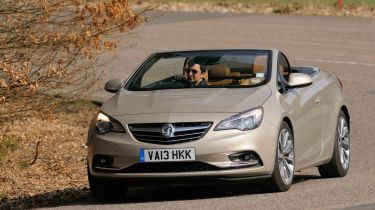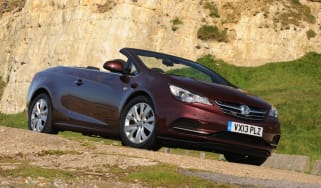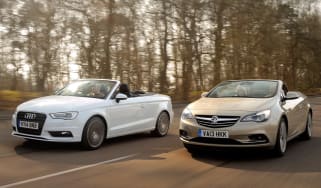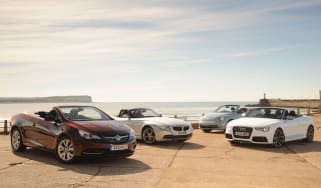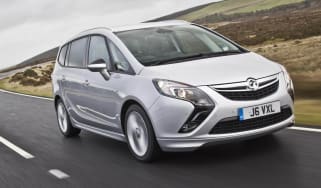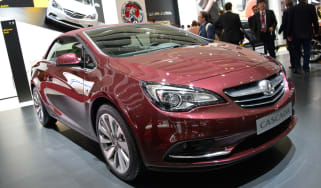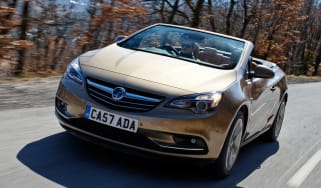Vauxhall Cascada review
The Vauxhall Cascada convertible offers lots of space and comfort, but it comes at a price

The Vauxhall Cascada was introduced the 2013 Geneva Motor Show, when it replaced the Astra TwinTop. This new model uses Astra and Insignia bits, but while the old car had a complex folding metal hard-top, the Cascada gets a traditional fabric roof.
There are two trim options, SE and Elite, and engines range from the 1.4 petrol turbo to the powerful 2.0 CDTi BiTurbo. The 2.0-litre diesel will be familiar to owners of the Astra and Insignia.
Higher powered petrol and diesel engines will join the range at a later date. The Cascada is no sports car, but all versions do come with the HiPerStrut front suspension from the Insignia VXR for surprisingly good handling. better still, a supple ride makes the Vauxhall a composed and comfortable long distance cruiser.
Vauxhall is attempting to distance itself from its successful, value-for-money sister brand, Chevrolet, by moving upmarket. And so, following the launch of the Adam ‘premium’ city car, comes the Cascada - a high-spec, full-size convertible that slots into the range between the Astra and Insignia.
Engines, performance and drive
Vauxhall has fitted HiPerStrut front suspension from the Astra VXR hot hatch, but the Audi A3 Cabriolet is more enjoyable to drive. The Cascada’s soft suspension soaks up bumps reasonably well, yet there’s plenty of body roll in corners and the steering lacks feedback, so there’s not much fun to be had.
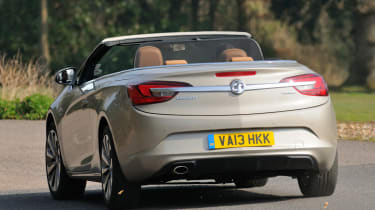
Our car was fitted with the £790 optional FlexRide two-stage adaptive dampers. Sport and Tour modes firm up or soften off the damping, but it just feels harsher in Sport mode, while the car wallows over bumps in the Tour setting.
Used - available now

2020 Land Rover
Range Rover Sport
63,328 milesAutomaticDiesel3.0L
Cash £32,299
2017 Hyundai
i20
35,329 milesManualPetrol1.2L
Cash £8,499
2017 Ford
Fiesta ST
48,781 milesManualPetrol1.6L
Cash £9,599
2022 Hyundai
Ioniq 5
15,532 milesAutomaticElectric
Cash £21,999With the roof down, the Cascada is pretty refined. There’s next to no wind buffeting, so you can easily forego fitting the standard wind deflector, while a second, smaller windbreak slots between the back seats to help reduce buffeting for rear passengers.
The new 1.6-litre petrol engine is smooth and refined, while the diesel is punchy and promises decent economy. However, fr most people the 138bhp 1.4-litre petrol will be the best bet, as it suits the Cascada's relaxed character. A potent BiTurbo diesel, which can cover the 0-60mph sprint in 8.9 seconds and hit a top speed of 143mph, and a high-powered 197bhp 1.6-petrol, are available too.
MPG, CO2 and Running Costs
The entry-level 1.4-litre petrol does struggle a bit with the car’s weight, which will have an impact on fuel bills and make the claimed 44.8mpg hard to match. The all-new 1.6-litre petrol delivers more performance, but is only available with an automatic gearbox, which means an above average thirst for fuel and disappointingly high CO2 emissions.
A 2.0-litre diesel - which offers similar power to the 1.6 petrol but with more torque - returns up to 54.3mpg and emits 138g/km of CO2, although it’s quite a noisy engine. Making matters worse are poor predicted residuals for the Vauxhall, with our experts predicting that even the best performing versions will struggle to hold onto 40 percent of their new value after three years.
As well as a standard wind deflector and heated leather seats, you get a heated leather wheel, cruise control and rear parking sensor. Extras include an acoustic hood (£300), although you can’t specify xenon lights or blind spot monitors individually – you have to add expensive option packs instead.
Interior, design and technology
The Cascada ditches the hi-tech folding hard-top in favour of a fabric roof, while its overall look is more upmarket than the Astra TwinTop’s. The car has been designed from scratch in an attempt to mark it out as a separate model, but there are plenty of styling elements that directly link it with the Astra.
Its rounded front end and eagle-eye headlamps look similar, even down to the ‘eyebrow’ daytime running lights, and although the sculpted sides are different, they appear quite similar to the Astra’s.
The large, steeply raked windscreen and rising window line give the Cascada a tail-heavy appearance, while the large bootlid and rounded tail bear more than a passing resemblance to those of the Insignia hatch. The fabric roof creates a low roofline, although the steeply raked back window means a letterbox view through the rear view mirror.
Lower the hood and you get frameless windows and a flat rear deck. Inside, less effort has been made to set the Cascada apart from the Astra. The sweeping dash design is different, but the confusing array of buttons and chrome-ringed dials is carried over wholesale, but the quality of the plastics isn’t up to the standard of rivals.
In an effort to move the car upmarket, it has a stitched leather dash top and standard hide trim.
Practicality, comfort and boot space
The Cascada is a full-size convertible, which means that it features space for four people and their luggage. Space in the front is good, although visibility is a little hampered by the chunky A-pillar.
In the rear, there’s just about space for two adults for short trips, although knee room is a little tight, and headroom suffers with the roof up.
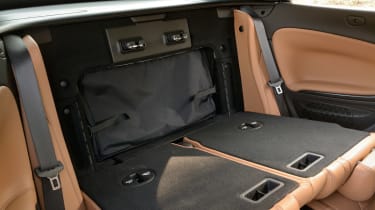
The tailgate badge doubles as the boot release, and the clamshell rear opens to reveal a 380-litre luggage area. This is bigger than the Audi’s, but the high load lip and narrow opening make it trickier to use. The split back seats fold at the press of two buttons in the boot. You must lower a partition before stowing the roof, and this reduces the available space by a significant 100 litres.
Lowering the roof takes 17 seconds and can be completed at speeds of up to 30mph. The interior is also stuffed full of useful cubby holes, including the deep door bins and a large centre console bin that will easily swallow mobile phones and personal music devices.
Reliability and Safety
Vauxhall claims that although the Cascada is larger than the previous Astra TwinTop, it’s 43 per cent stiffer, which is good for both handling dynamics and robustness in the event of a crash. Every Cascada comes with a host of airbags and ESP, and all have reinforced windscreens and pyrotechnic roll-bars that spring up from behind the rear seats in the event of a crash.
Options include Vauxhall’s Front Camera system, which includes traffic sign recognition, lane departure warning and forward collision alert, as well as blind spot alert. Much of the technology and engines are already in-use across the Vauxhall range, and the new 1.6-litre petrol engine will be fitted to other cars, so expect similar reliability to the Astra and Insignia.
Even so, Vauxhall finished a disappointing 26th out of 32 in our 2013 Driver Power customer satisfaction survey, with only three of its cars making it into the overall top 100.
